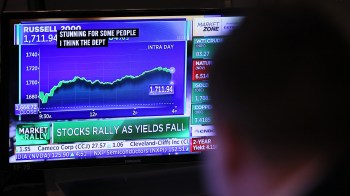20 years after Wall’s fall, Leipzig rises
TEXT OF STORY
Kai Ryssdal: In Germany today Chancellor Angela Merkel led the celebrations marking 20 years since the fall of the Berlin Wall. She re-enacted her own crossing of what was then the border between East and West on the night of November 9th, 1989. Democracy and capitalism have brought a lot of changes to East Germany since that night. Most would probably say for the better. But reunification hasn’t always been easy. Even in one of the East’s most successful cities. Marketplace’s Amy Scott reports from Leipzig.
AMY SCOTT: Leipzig today is very different from the city of 20 years ago. Back then it was an industrial center, polluted by coal mining and chemical plants.
HINRICH LEHMANN-GRUBE: Decayed, soot-covered, evil-smelling.
Hinrich Lehmann-Grube came here from Hannover to serve as Leipzig’s first “post reunification” mayor. He found a city where roads and buildings were crumbling from decades of neglect. But before World War II, Leipzig had been one of Germany’s wealthiest cities, and an arts and culture powerhouse.
LEHMANN-GRUBE: And if you looked closely, you could still see that. Like somebody who looks at an old garden where many winters have gone over, but you can see how it was meant to be. And this attracted me.
It attracted others too. In 1991 Chris Smith arrived from Frankfurt to set up a new branch of consulting firm Price Waterhouse.
CHRIS SMITH: It was a very get up and go time. You know, I’d say to people, well you know if you want to play tennis, then well, build a tennis court. Yeah? If you want it to get done don’t look to anybody else to do it. You’re here to do it yourself.
That spirit and money from the West helped rebuild Leipzig. Today, Smith heads an office of more than 100 employees in this thriving modern city, with its lively arts scene and growing population. But reunification also opened the region to competition from companies in Western Germany — 100, 000 mining and other jobs disappeared. And unemployment in Leipzig is twice as high as in many western cities.
One economic bright spot is this ultramodern BMW plant.
MICHAEL JANSSEN: So we’re in a body shop now, and we just have a look at more than 700 robots doing most of the work here.
BMW spokesman Michael Janssen leads me through the welding area, where sparks fly as the frame of a one-series hatchback takes shape. He says the plant has created some 5,000 jobs.
JANSSEN: When we came here, the unemployment rate was more than 21 percent, which was quite bad for the region, but it was good for us because we could choose really skilled people, and they were available.
They were cheaper too.
Janssen says workers here make about 25-percent less than their counterparts in BMW’s home base of Bavaria.
Jochen Staadt of Berlin’s Free University says lower wages in eastern Germany are supposed to keep the region competitive. He says that seemed fair, when the cost of living was also much lower.
JOCHEN STAADT: But nowadays, when you go shopping, you pay the same prices. And the people say, “When we pay the same prices, why don’t we earn for the same work the same amount of money?”
Staadt says this is one reason many in eastern Germany say they were better off in the old days. That nostalgia shows up here in support for the Left, the successor to the communist party.
At the main train station in Leipzig, Katrin Dost serves bratwurst to travelers at a small sausage stand. She has a job. But she understands why some long for the days of the communist German Democratic Republic.
KATRIN DOST: Because all people in the GDR had work. All people. And now a lot of people have no work. We have fear for the future. Have I next year this job?
Officials in Leipzig are working to attract new industries, like green technology. And one economist told me in some ways the region’s weakness has actually helped it ride out the global recession.
Companies aren’t as dependent on exports as those in western Germany, where unemployment has actually risen faster.
In Leipzig, I’m Amy Scott for Marketplace.
There’s a lot happening in the world. Through it all, Marketplace is here for you.
You rely on Marketplace to break down the world’s events and tell you how it affects you in a fact-based, approachable way. We rely on your financial support to keep making that possible.
Your donation today powers the independent journalism that you rely on. For just $5/month, you can help sustain Marketplace so we can keep reporting on the things that matter to you.


















